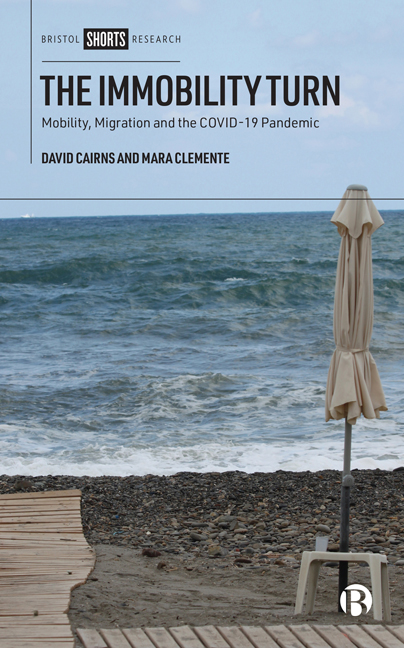Book contents
- Frontmatter
- Contents
- List of Figures
- About the Authors
- one COVID-19 and the Immobility Turn
- two Theorizing the Immobility Turn
- three From Overtourism to Undertourism, and Back Again
- four International Student Mobility and Immobility
- five Maintaining Migration during a Pandemic
- six Mobility after an Immobility Turn
- Notes
- References
- Index
four - International Student Mobility and Immobility
Published online by Cambridge University Press: 18 January 2024
- Frontmatter
- Contents
- List of Figures
- About the Authors
- one COVID-19 and the Immobility Turn
- two Theorizing the Immobility Turn
- three From Overtourism to Undertourism, and Back Again
- four International Student Mobility and Immobility
- five Maintaining Migration during a Pandemic
- six Mobility after an Immobility Turn
- Notes
- References
- Index
Summary
This chapter looks at another form of international travel greatly affected by the COVID-19 pandemic: the mobility of tertiary education students. Again, the focus is on the Portuguese context, and as in Chapter 3, the discussion engages with developments before and after the start of the crisis, with the decade prior to the pandemic characterized by a sustained period of expansion, followed by uncertainty. However, as suggested by the statistics presented in Chapter 1, while the status of shortterm exchanges – credit mobility – is unclear due to limitations in the data, there are some signs that levels of student migration to Portugal actually increased during the pandemic.
Such developments reflect the fact that the country has a distinct international student mobility profile, perhaps different to the European norm, having become a destination for visitors from neighbouring nations, via programmes such as the European Commission-supported Erasmus platform, as well as those from farther afield, including Africa, Asia and the Americas, with many of these students staying in Portugal for long durations (Sin et al, 2017; França and Cairns, 2020; Malet Calvo et al, 2020). As noted in prior research on this topic, it may have been logical for these latter students to stay in place after the start of the crisis due to a lack of opportunities to return to societies more deeply affected by the pandemic (Cairns et al, 2021a; 2021b; Malet Calvo et al, 2021).
Looking at the broader picture, we also wish to contribute to the student mobility research field. The topic generated a huge volume of academic studies and grey literature during the ‘mobility turn’ era (see Chapter 2). This material suggests that there has been an expansion and a diversification of the internationalized learning experience, which came to integrate formal, informal and non-formal pedagogies as a means of generating valuable forms of mobility capital (Cairns 2021a, 2021b). For this reason, having already looked at some of the available statistics in Chapter 1, the main part of this chapter focuses on the qualitative impact of the COVID-19 pandemic, reflecting on international student life at the most intensive periods of lockdown.
- Type
- Chapter
- Information
- The Immobility TurnMobility, Migration and the COVID-19 Pandemic, pp. 52 - 72Publisher: Bristol University PressPrint publication year: 2023



